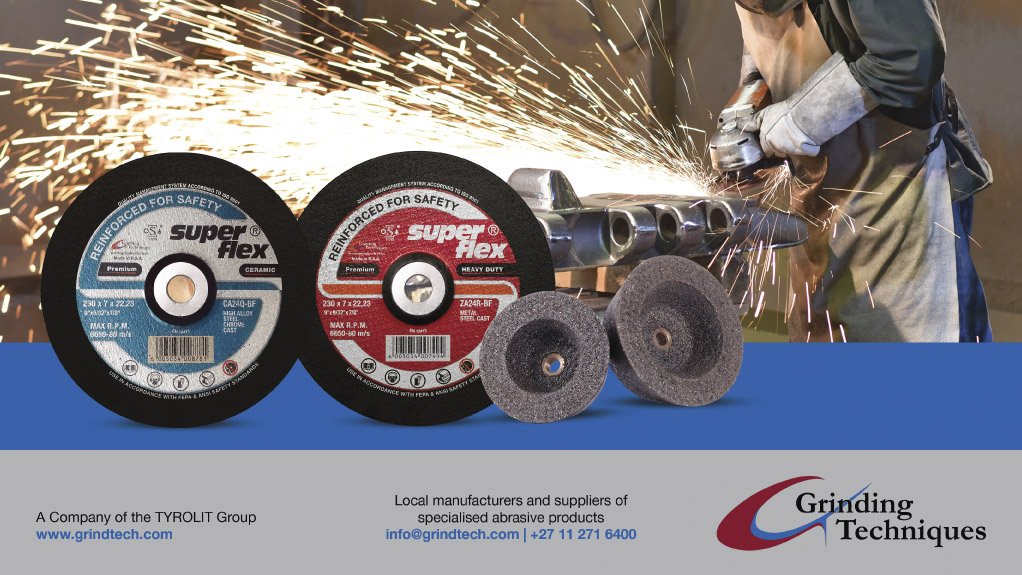Grinding Techniques – INNOVATIVE partner to the Foundry Industry
This article has been supplied as a media statement and is not written by Creamer Media. It may be available only for a limited time on this website.
In the modern age of industrial innovation, it has become more important than ever to analyse the
performance of every tool at your disposal. The margin between success and failure, profit or loss may be determined by the small differences in production times and costs we often take for granted. More often than not we do things the same way we have always done them, even though the parameters and environment we operate in have changed.
With the global Covid-19 pandemic significantly impacting the current economic climate we find ourselves in, many rely on price as a deciding factor when abrasives are considered and, in many cases, settle for entry level abrasives. This often results in a costly and time-consuming operation, as more abrasive products are required to complete the job due to the lower stock removal from the product, which in turn, leads to operator fatigue. It is therefore of utmost importance to consider the type of casting, machinery and abrasive products used in combination when fettling castings.
With the correct combination of abrasive grains, there are numerous advantages. Instead of spending hours to a full day fettling a single casting, time can be cut down to just a few minutes leading to other benefits like saving on electricity, machine wear and tear as well as reduced operator fatigue.
When fettling a casting made out of Hard Chrome with an approximate riser of 50mm, if using an under-powered angle grinder, this could cause a significant increase in fettling time, resulting in the efficiency of the grinding disc being severely reduced. The slower the speed at which the grinding disc rotates, the softer it acts, taking much longer to chip away the material with every revolution due to the disc not attaining the grain in place for optimal performance.
To attain better results, there are a few options available.
Firstly, using an angle grinder of at least 2.6kW will help the disc not to lose peripheral speed when in operation, thus increasing the performance of the disc. Secondly switching to a higher product tier, like either the Superflex 230x7x22.2 ZA24R Premium containing Zirconium abrasive grains, or the Superflex 230x7x22.2 CA24Q-BF Premium Ceramic grinding disc containing added seeded gel. This alone, could significantly increase results.
In general, using abrasive products containing Zirconium grains rather than Aluminum Oxide grains usually prove much more efficient, as the Zirconium grains break down during application, exposing sharper cutting edges - perfectly suited to difficult alloys. In cases where optimum results are required, making use of the Ceramic grinding disc containing seeded gel would prove to be the ideal choice. Not only does the Ceramic disc offer a much tougher structured grain, but will, when put under pressure, break down in much smaller fragments exposing sharper cutting edges, which significantly increases the cutting rate and minimizes heat input into the work piece.
Cup stones are another possible solution for fettling requirements, as they have either a M14.2 or a 5/8 BSW thread, which saves time compared to changing grinding discs, as the cup is simply screwed onto either an angle grinder or a pneumatic grinder. Due to the design of the cup stone being flared (Type 11), grinding Hi-Chrome materials and specifically crusher balls are made easier to work around the shape of the ball’s circumference, preventing unnecessary deep grind marks compared to that of grinding discs when grounding away the risers.
Grinding Techniques have been manufacturing abrasives since 1981, with a Research and Development Team constantly testing, reviewing and introducing new products ranging from Aluminum Oxide, Silicon Carbide, Zirconium and Ceramic / Seeded gel grains. With our years of industry experience and partner to the Foundry Industry we are leaders in helping you choose the best solution for your application.
Comments
Press Office
Announcements
What's On
Subscribe to improve your user experience...
Option 1 (equivalent of R125 a month):
Receive a weekly copy of Creamer Media's Engineering News & Mining Weekly magazine
(print copy for those in South Africa and e-magazine for those outside of South Africa)
Receive daily email newsletters
Access to full search results
Access archive of magazine back copies
Access to Projects in Progress
Access to ONE Research Report of your choice in PDF format
Option 2 (equivalent of R375 a month):
All benefits from Option 1
PLUS
Access to Creamer Media's Research Channel Africa for ALL Research Reports, in PDF format, on various industrial and mining sectors
including Electricity; Water; Energy Transition; Hydrogen; Roads, Rail and Ports; Coal; Gold; Platinum; Battery Metals; etc.
Already a subscriber?
Forgotten your password?
Receive weekly copy of Creamer Media's Engineering News & Mining Weekly magazine (print copy for those in South Africa and e-magazine for those outside of South Africa)
➕
Recieve daily email newsletters
➕
Access to full search results
➕
Access archive of magazine back copies
➕
Access to Projects in Progress
➕
Access to ONE Research Report of your choice in PDF format
RESEARCH CHANNEL AFRICA
R4500 (equivalent of R375 a month)
SUBSCRIBEAll benefits from Option 1
➕
Access to Creamer Media's Research Channel Africa for ALL Research Reports on various industrial and mining sectors, in PDF format, including on:
Electricity
➕
Water
➕
Energy Transition
➕
Hydrogen
➕
Roads, Rail and Ports
➕
Coal
➕
Gold
➕
Platinum
➕
Battery Metals
➕
etc.
Receive all benefits from Option 1 or Option 2 delivered to numerous people at your company
➕
Multiple User names and Passwords for simultaneous log-ins
➕
Intranet integration access to all in your organisation





















